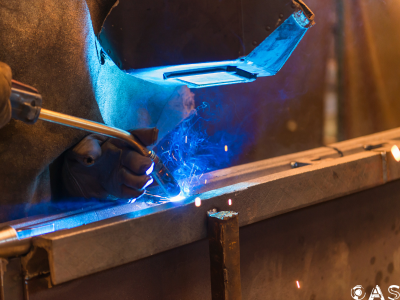The Future of Welding
Bridging the Skills Gap in the UK

The welding industry in the UK is facing a significant challenge: a shortage of skilled welders. This issue is becoming more pressing as a large portion of the current workforce approaches retirement. By 2027, it's estimated that around 50% of the nation's welders will retire, creating a substantial gap that needs to be filled.
Why is There a Shortage?
Several factors contribute to this shortage:
- Aging Workforce: Many welders are nearing retirement age.
- Increased Demand: The construction industry alone is expected to need an additional 36,000 welders by 2027.
- Pandemic and Brexit: These events have disrupted training and recruitment efforts.
- Lack of Training Programmes: There are not enough comprehensive training programmes to develop new talent.
The Impact of the Shortage
If the welding skills gap is not addressed, it could lead to several significant consequences:
- Project Delays: Construction, engineering and manufacturing projects may face delays due to a lack of skilled workers.
- Increased Costs: Businesses may have to offer higher wages to attract and retain welders.
- Compromised Quality: Insufficiently trained welders may produce substandard work, leading to safety issues and costly repairs.
- Reduced Competitiveness: The UK's defence, engineering, manufacturing and construction sectors could become less competitive globally.
- Economic Impact: The skills gap can hinder the growth of key industries, affecting the broader economy.
The welding skills gap also has significant implications for the nuclear/fusion sectors. Nuclear welders are essential for the safe construction, maintenance, and repair of components in nuclear power plants. The precision and expertise required in nuclear welding are critical for ensuring the integrity and safety of nuclear facilities. As the UK looks to expand its nuclear/fusion energy capabilities, the demand for skilled welders in this sector will only increase. Investing in welding training programs can help bridge the skills gap and support the growth of the nuclear/fusion industry.
To tackle this issue, a concerted effort is needed from educational institutions, industry leaders, and the government. Here are some steps that can be taken:
- Invest in Training Programmes: Developing comprehensive training programmes to equip new welders with the necessary skills.
- Promote the Profession: Highlighting the importance and benefits of a career in welding to attract new talent.
- Create Pathways for New Talent: Establishing clear educational and career pathways for aspiring welders.
MTC Training offers a wide range of training courses and apprenticeships, from introductory to advanced, designed to meet the needs of the UK manufacturing are now playing a crucial role in addressing the welding skills gap through its Oxfordshire Advanced Skills Training facility on the Culham Campus near Abingdon. New programmes will provide both off-the-shelf welding solutions as well as bespoke training packages tailored to client needs.
By delivering targeted training programmes, MTC Training aims to:
- Upskill Workers: Providing access to welding training will allow companies to invest in their people.
- Close the Skills Gap: Helping to address the shortfall in relevant welding skills.
- Support Career Development: Offering balanced career paths through accessible training and employment opportunities.
- Enhance Competitiveness: Increasing the pool of highly talented welders who can pass on their knowledge to the next generation.
Transferable Skills in Welding
Welding is not just about joining materials; it involves a range of skills that are highly transferable to other industries. Some of these skills include:
- Attention to Detail: Welders must be meticulous in their work, ensuring precision and quality, which is valuable in any technical field
- Mathematics and Geometry: Understanding measurements and spatial relationships is crucial in welding and can be applied to various engineering and technical roles
- Problem-Solving: Welders often need to troubleshoot and find solutions to complex issues, a skill that is beneficial in many professions
- Communication: Effective communication is essential for coordinating with team members and ensuring safety protocols are followed
Addressing the welding skills gap is crucial for the sustainability and growth of the UK's manufacturing and construction sectors. By investing in training programmes, promoting the profession, and creating pathways for new talent, we can ensure a bright future for the welding industry. The efforts of institutions like MTC are vital in bridging this gap and supporting the transition to a more skilled and competitive workforce.